替换与重复
第十章 替换与重复
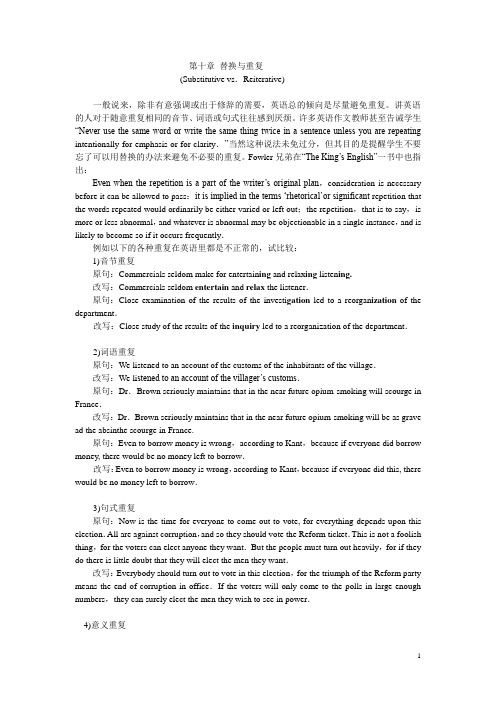
第十章替换与重复(Substitutive vs.Reiterative)一般说来,除非有意强调或出于修辞的需要,英语总的倾向是尽量避免重复。
讲英语的人对于随意重复相同的音节、词语或句式往往感到厌烦。
许多英语作文教师甚至告诫学生“Never use the same word or write the same thing twice in a sentence unless you are repeating intentionally for emphasis or for clarity.”当然这种说法未免过分,但其目的是提醒学生不要忘了可以用替换的办法来避免不必要的重复。
Fowler兄弟在“The King‟s En g lish”一书中也指出:Even when the repetition is a part of the writer‟s original plan,consideration is necessary before it can be allowed to pass:it is implied in the terms …rhetorical‟or significant repetition that the words repeated would ordinarily be either varied or left out;the repetition,that is to say,is more or less abnormal,and whatever is abnormal may be objectionable in a single instance,and is likely to become so if it occurs frequently.例如以下的各种重复在英语里都是不正常的,试比较:1)音节重复原句:Commercials seldom make for entertain ing and relax ing listen ing.改写:Commercials seldom entertain and relax the listener.原句:Close examination of the results of the investi gation led to a reorgan ization of the department.改写:Close study of the results of the inquiry led to a reorganization of the department.2)词语重复原句:We listened to an account of the customs of the inhabitants of the village.改写:We li stened to an account of the villager‟s customs.原句:Dr.Brown seriously maintains that in the near future opium-smoking will scourge in France.改写:Dr.Brown seriously maintains that in the near future opium-smoking will be as grave ad the absinthe scourge in France.原句:Even to borrow money is wrong,according to Kant,because if everyone did borrow money, there would be no money left to borrow.改写:Even to borrow money is wrong,according to Kant,because if everyone did this, there would be no money left to borrow.3)句式重复原句:Now is the time for everyone to come out to vote, for everything depends upon this election.All are against corruption,and so they should vote the Reform ticket.This is not a foolish thing,for the voters can elect anyone they want.But the people must turn out heavily,for if they do there is little doubt that they will elect the men they want.改写:Everybody should turn out to vote in this election,for the triumph of the Reform party means the end of corruption in office.If the voters will only come to the polls in large enough numbers,they can surely elect the men they wish to see in power.4)意义重复原句:He asked the divisions to give their mutual cooperation to the project.改写:He asked the divisions to cooperate on the projeet.原句:The bachelor‟s degree is a necessary requisite for matric ulation.改写:a)The bachelor‟s degree is necessary (or: a requisite) for matriculation.b)The bachelor‟s degree is required for matriculation./Matriculation require$the bachelor…s degree.原句:May I be permitted to state that the activities of the Club are not limited only to aeronautics?改写:a)May I be permitted to state that the activities of the Club are not limited to aeronautics?b)May I be permitted to state that the activities of the Club are not directed only to eronautics?意义重复又如以下词组:advance planning still remainsexactly identical entirely completeforeign imports assembled togetherrepeat again audible to the earthroughout the entire summer dash quickly英语文体学家批评这类重复是粗心的(careless)、笨拙的(clumsy),因而也是令人厌烦的(boring)。
最新英汉对比研究-替换与重复精品文档

• 我们村过去有3000人口。旧社会里死的死,逃的逃。
• 哈利德放下烟斗,两手交叉着放在脖子后面,转过头去看窗子。
Halliday put his pipe down,crossed his hands behind his neck ,and turned his face towards the window.(“The Apple Tree”)
• 1)However, we actually learn a foreign language much faster than we do our mother tongue.
• 然而,事实上我们学习一门外语比学习母语快得多。 • 2)…in other words, you were studying the language all day long! You did this for
five years,… • 换句话说,你整天在学习语言,你这样学习已经五年了。 • 3)You should help him since you have promised to do so. • 你答应了要帮助他就应当帮助他
• 4)你晚上不想去电影院,我也不想去。 • You don`t want to go to the cinema tonight, neither do I. • 5)我喜欢读小说,他也喜欢读小说。 • I like reading novels, so does he. • 6)---狗正在抓门。 ---是的,总是抓门。 • ---The dog is scratching the door. ---Yes,he always does it /does that. • 7)---玛丽要去参加竞赛。---简也要参加竞赛。 • ---Mary will enter the competition. ---So will Joan . • 8)你要求我离开我就离开了。 • You ask me to leave , and so I did.
英译汉替换与重复
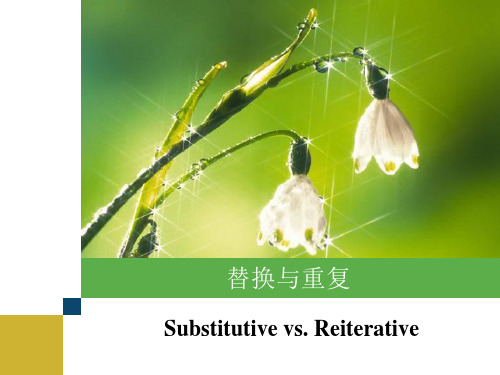
19
One cannot learn to produce a sound from an explanation only, or get a correct idea of a flavor from a description: a sound must be heard, a color seen, a flavor tasted, an odor inhaled. 人不能只从讲解中学会发音,也不能光靠描述而 体会某种滋味。声音必须耳闻,颜色必须眼见, 滋味必须口尝,气味必须吸入。
替换与重复
Substitutive vs. Reiterative
除非修辞的需要,英语一般要避免重复
Never use the same word or write the same thing twice in a sentence unless you are repeating intentionally for emphasis or for clarity.
7
汉语则通过重复强化行文的语气和修辞, 使语言生动有力。 英语宜采用替代、省略、变换等避免重复, 使行文简洁、有力,符合英语民族心理习 惯。
8
一、替代 1 名词性替代 英译汉不如英译法那么容易。 Translation from English into Chinese is not so easy as that from English into French.
11
3 分句性替代
中华民族从来就是一个伟大的勇敢的勤劳的民族, 只是在近代落伍了。这种落伍,完全是被外帝国 主义和本国反动政府所压迫和剥削的结果。 The Chinese have always been a great, courageous and industrious nation; it is only in modern times that they have fallen behind, which was due entirely to oppression and exploitation by foreign imperialism and domestic reactionary governments.
替换和重复

10.替换与重复一般来说,除非有意强调或出于修辞的需要,英语总的倾向是避免重复,而汉语单音节文字的特点便于字和词的重叠。
重叠构词不仅使得词语音节匀称,形式整齐,而且赋予词语以新的意义和感情色彩。
一、替代1.替代的形式(1)名词性替代:用代词或某些名词来取代名词(短语):Eg:A:英语中,我们的民族再也不是一个被人侮辱的民族了。
Ours is no longer a nation subject to insult and humiliation.B:汉语中:Electrical charges of a similar kind repel each other and those that are dissimilar attract.同性电荷相斥,异性电荷相吸。
(2)动词性替代:用动词的替代词来取代动词。
Eg:A:英语中:代动词:do.复合代动词:so do.do it.do that.B:汉语中:You don't want to lag behind .Neither does he.你不愿意落后,他也不愿意落后(3)分句性替代:用替代词来取代分句或分句的一部分。
Eg:A:英语中:用替代词so或not来取代充当宾语或that从句。
B:汉语中:一个人的工作,究竟是三分成绩七分错误还是七分成绩三分错误,必须有个根本的估价。
We must have a fundamental education of a person's work and establish whether his achievements amount to 30 per cent and his mistakes to 70 per cent ,or vice ve rsa .总得来说,英语名词代称,以避免重复,汉语名词代称,名词实称,因而重复,汉语代词的使用也远不如英语。
英语的代词在时常常采用复说、还原或省略的方法加以处理。
替换与重复的对比
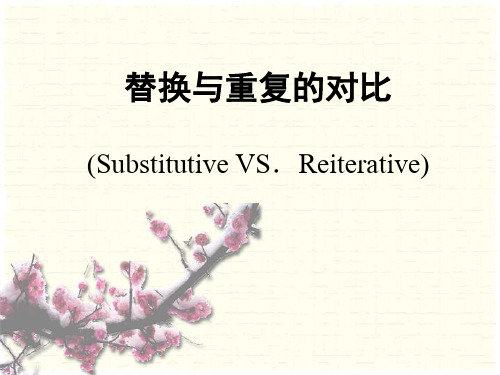
省略(omission)
• 省略和替代一样,也是避免重复的手段,语 言学称为“零位替代”(zero-substitution)。 英语常省略已经出现的词,而汉语则重复这 些词语。
阅读训练人的眼睛,说话训练人的口齿,写作训练 人的思维。 Reading exercises one’s eye’s; speaking, one’s tongue; while writing one’s mind. (F.Bacon)
你不愿意落后,她也不愿意落后。
You don’t want to lag behind. Neither does she.
The
Americans are reducing their defence expenditure this year. I wonder if the Russians will do so.
– 2)沉默啊!沉默啊!不在沉默中爆发,就在沉默 中灭亡。(鲁迅《呐喊》自序) Silence! Silence! Unless we burst out, we shall perish in this silence. – 3)We have to analyze and solve problems. 我们必须分析问题、解决问题。
一个人的工作,究竟是三分成绩七分错误,还是 七分成绩三分错误,必须有个根本的估价。 We must have a fundamental evaluation of a person’s work and establish whether his achievements amount to 30 percent and his mistakes to 70 percent, or vice versa.
汉英笔译基础教程第8章 重复与替换

8.3 句式的重复
❖ 部分保留 ❖ 秋天,无论在什么地方的秋天,总是好的;可
是啊,北国的秋,却特别地来得清,来得静, 来得悲凉。 ❖Autumn, wherever it is, always has something to recommend itself. In North China, however, it is particularly limpid, serene and melancholy.
8.1.2 舍弃叠音效果
❖ 成群成群的蝗虫毁灭了大片大片的稻田庄稼。 ❖Hordes of locusts ruined the crops in tracts of rice
field. ❖ 这是一条幽僻的路;白天也少人走,夜晚更加寂
寞。荷塘四面,长着许多树,蓊蓊郁郁的。
❖It is peaceful and secluded here, a place not frequented by pedestrians even in the daytime; now at night, it looks more solitary, in a lush, shady ambience of trees all around the pond.
8.3 句式的重复
❖ 融合法 ❖ 她底思想似乎浮漂在极远,可是她自己捉摸不
定远在那里。于是慢慢地跑回来,跑到眼前, 跑到她底孩子底身上。 ❖Lost in deep thought, she seemed absolutely dead to the reality surrounding her. Later she gradually came to, and found herself face to face with the present and her child.
英汉语篇衔接手段中替换与重复的对比分析
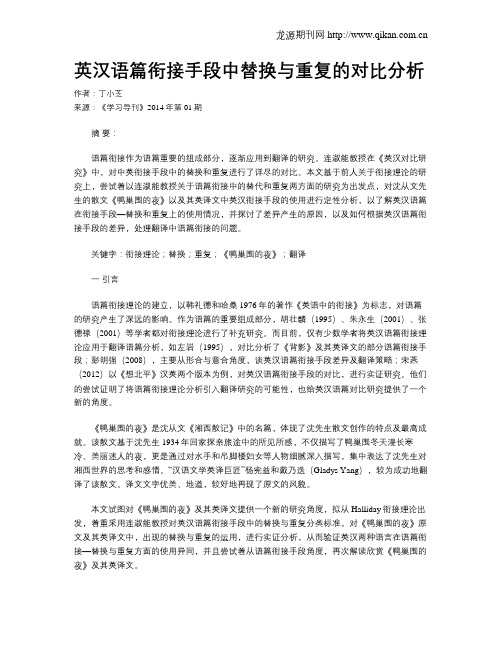
英汉语篇衔接手段中替换与重复的对比分析作者:丁小芝来源:《学习导刊》2014年第01期摘要:语篇衔接作为语篇重要的组成部分,逐渐应用到翻译的研究。
连淑能教授在《英汉对比研究》中,对中英衔接手段中的替换和重复进行了详尽的对比。
本文基于前人关于衔接理论的研究上,尝试着以连淑能教授关于语篇衔接中的替代和重复两方面的研究为出发点,对沈从文先生的散文《鸭巢围的夜》以及其英译文中英汉衔接手段的使用进行定性分析,以了解英汉语篇在衔接手段—替换和重复上的使用情况,并探讨了差异产生的原因,以及如何根据英汉语篇衔接手段的差异,处理翻译中语篇衔接的问题。
关键字:衔接理论;替换;重复;《鸭巢围的夜》;翻译一引言语篇衔接理论的建立,以韩礼德和哈桑1976年的著作《英语中的衔接》为标志,对语篇的研究产生了深远的影响。
作为语篇的重要组成部分,胡壮麟(1995)、朱永生(2001)、张德禄(2001)等学者都对衔接理论进行了补充研究。
而目前,仅有少数学者将英汉语篇衔接理论应用于翻译语篇分析,如左岩(1995),对比分析了《背影》及其英译文的部分语篇衔接手段;彭明强(2008),主要从形合与意合角度,谈英汉语篇衔接手段差异及翻译策略;宋燕(2012)以《想北平》汉英两个版本为例,对英汉语篇衔接手段的对比,进行实证研究。
他们的尝试证明了将语篇衔接理论分析引入翻译研究的可能性,也给英汉语篇对比研究提供了一个新的角度。
《鸭巢围的夜》是沈从文《湘西散记》中的名篇,体现了沈先生散文创作的特点及最高成就。
该散文基于沈先生1934年回家探亲旅途中的所见所感,不仅描写了鸭巢围冬天漫长寒冷、美丽迷人的夜,更是通过对水手和吊脚楼妇女等人物细腻深入描写,集中表达了沈先生对湘西世界的思考和感情。
“汉语文学英译巨匠”杨宪益和戴乃迭(Gladys Yang),较为成功地翻译了该散文。
译文文字优美、地道,较好地再现了原文的风貌。
本文试图对《鸭巢围的夜》及其英译文提供一个新的研究角度,拟从Halliday衔接理论出发,着重采用连淑能教授对英汉语篇衔接手段中的替换与重复分类标准,对《鸭巢围的夜》原文及其英译文中,出现的替换与重复的运用,进行实证分析,从而验证英汉两种语言在语篇衔接—替换与重复方面的使用异同,并且尝试着从语篇衔接手段角度,再次解读欣赏《鸭巢围的夜》及其英译文。
英语的替换与汉语的重复

Substitutive VS Reiterative替换与重复壹替换(Substitutive )贰重复(Reiterative )第一部分Substitutive替换英语中为了避免重复,句子中的某些部分可以省略省略02用替代的形式来代替句中或上文已出现的词语或内容,这是用英语说话或写作的一项重要原则。
01 替代一个英语单词通过词形转换可以变成很多个不同词性的单词.03 变换M: I am taller than he, which is unquestionable. W: he does be shorter than you.1 替代替代用自己的话来说就是:用另一个词或词组替代文中需要再一次出现的词。
这一类词有:第三(非)人称代词,指示代词(this , that , those , these ),关系代词(who , whom , whose , that , which ),连接代词(who , where , what , which ),不定代词(one , much , other , both ),名词,动词等The more we practice a foreign language, the easier it is 。
我们练习一门外语越多,这门外语就越容易。
人称代词1 替代The language of a child differs from that of his parents. 孩子们的语言不同于家长的语言指示代词关系代词He first met the woman whom he would one daymarry.他第一次遇见那个女人,后来他终于和那个女人结婚了1 替代Can you give me a few nails? I need some .你能给我几颗钉子吗?我需要一些钉子。
不定代词名词I don`t want any more coffee . I`ve had enough .我不想和咖啡了。
替换与重复的对比PPT课件

• 这些替代的形式主要有:名词性替代 (nominal substitution) ,动词性替代(verbal substitution) ,分句性替代(clausal substitution) 。
.
6
1)名词性替代:用代词或某些名词来取代名词(词
组)来避免重复。这类词如:第三人称代词、指示代 词、关系代词、连接代词、不定代词以及名词等。
你不愿意落后,她也不愿意落后。 You don’t want to lag behind. Neither does she.
The Americans are reducing their defence expenditure this year. I wonder if the Russians will do so.
• 衔接是将语篇不同部分联系在一起的语 法、词汇和其它手段的统称。
• “衔接是语篇分析或篇章语言学中可用 于翻译的最有用的成分”。 ——Peter Newmark
.
3
Halliday & Hasan在Cohesion in English 中将 英语的衔接手段分为五种:
• ⒈照应(reference) • ⒉替代(substitution) • ⒊省略(ellipsis)——零位替代 • ⒋连接(conjunction) • ⒌词汇衔接(lexical cohesion)
A chemical change is one in which the structure of particles is changed and a new substance is formed. 化学变化是改变粒子结构、形成新物质的一种 变化。
.
8
• 2)动词性替代:用替代词来取代谓语动词(词 组)。
英译汉替换与重复

❖ 化学变化是改变粒子结构,形成新物质的一种变 化。
A chemical change is one in which the structure of particles is changed and a new substance is formed.
9
一定的文化是一定社会的政治和经济的反映,又给 予一定社会的政治和经济以巨大的作用和影响。
1
在英语中避免如下几种重复: ❖1 音节的重复 ❖Commercials seldom make for entertaining and
relaxing listening. Commercials seldom entertain and relax the listener.
2
❖Close examination of the results of the investigation led to a reorganization of the department.
10
2 动词性替代
❖ 美国人今年削减国防开支,我怀疑俄国人也会这 样。
❖The Americans are reducing their defense expenditure this year. I wonder if the Russians will do so.
7
❖汉语则通过重复强化行文的语气和修辞, 使语言生动有力。
❖英语宜采用替代、省略、变换等避免重复, 使行文简洁、有力,符合英语民族心理习 惯。
8
1 名词性替代
一、替代
❖ 英译汉不如英译法那么容易。
Translation from English into Chinese is not so
easy as that from English into French.
翻译中的英汉语言对比
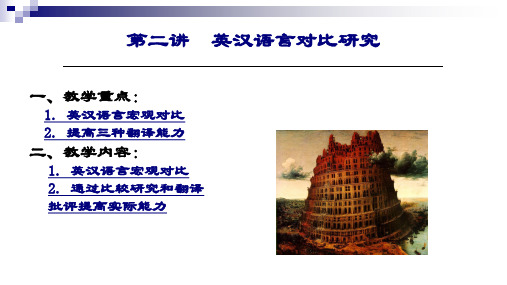
在教堂里,人们不仅要有礼貌,而且应该有一种虔 诚的态度。
Ⅰ. 英汉语言宏观对比
六、被动与主动(Passive vs. Active)
2、使用受事主语导致大量的“当然被动句” 昨晚我盖了两条被子。 Last night I was covered up with two quilts. 一匹马骑两个人。 Two persons rode one horse.
Ⅰ. 英汉语言宏观对比
六、被动与主动(Passive vs. Active)
3、当不需要或不可能说出施事者的时候,汉语可以 采用无主句或主语省略句来保持句子的主动形式 要制造飞机,就必须仔细考虑空气阻力问题。 Air resistance must be given careful consideration when the aircraft is to be manufactured.
Ⅰ. 英汉语言宏观对比
六、被动与主动(Passive vs. Active)
②“为…所”或“被…所”式 她被花言巧语所陶醉。 She is intoxicated with sweet words. ③“是…的”式 这些产品是我国制造的。 These products are made in our country.
2. 英语词序比较灵活,汉语词序相对固定 定语的位置 A candidate with little chance of success 一个当选希望极微的候选人 英国是第一个承认中国的西方大国。 Britain was the first western power to acknowledge the P.R.C.
Ⅰ. 英汉语言宏观对比
六、被动与主动(Passive vs. Active)
替换,重复
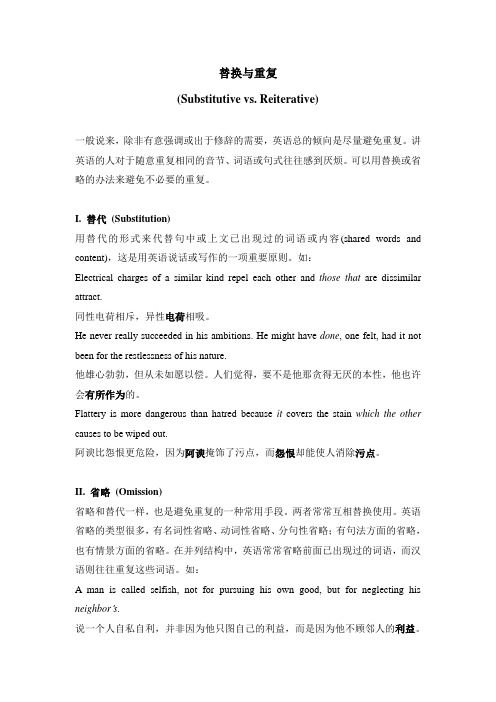
替换与重复(Substitutive vs. Reiterative)一般说来,除非有意强调或出于修辞的需要,英语总的倾向是尽量避免重复。
讲英语的人对于随意重复相同的音节、词语或句式往往感到厌烦。
可以用替换或省略的办法来避免不必要的重复。
I. 替代(Substitution)用替代的形式来代替句中或上文已出现过的词语或内容(shared words and content),这是用英语说话或写作的一项重要原则。
如:Electrical charges of a similar kind repel each other and those that are dissimilar attract.同性电荷相斥,异性电荷相吸。
He never really succeeded in his ambitions. He might have done, one felt, had it not been for the restlessness of his nature.他雄心勃勃,但从未如愿以偿。
人们觉得,要不是他那贪得无厌的本性,他也许会有所作为的。
Flattery is more dangerous than hatred because it covers the stain which the other causes to be wiped out.阿谀比怨恨更危险,因为阿谀掩饰了污点,而怨恨却能使人消除污点。
II. 省略(Omission)省略和替代一样,也是避免重复的一种常用手段。
两者常常互相替换使用。
英语省略的类型很多,有名词性省略、动词性省略、分句性省略;有句法方面的省略,也有情景方面的省略。
在并列结构中,英语常常省略前面已出现过的词语,而汉语则往往重复这些词语。
如:A man is called selfish, not for pursuing his own good, but for neglecting his neighbor’s.说一个人自私自利,并非因为他只图自己的利益,而是因为他不顾邻人的利益。
英汉语言对比替换与重复
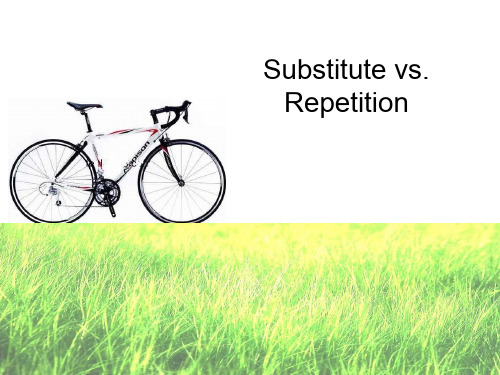
• More Examples: • advance planning • audible to the ear • assembled together • entirely complete • still remains
• foreign imports • repeat again • dash quickly • exactly identical • throughout the entire
• Substitution includes:
• 1.1 Nominal Substitution • 1.2 Verbal Substitution • 1.3 Clausal Substitution
• 1.1 Nominal Substitution
1) Personal Pronoun:he,she,it,they 2) Demonstrative Pronoun:this, that, these,
• 1)To use pronoun" so " or " not" to replace objective clause introduced by " that"
• 2)To use "if so" or "if not" to replace conditional clause
• 3)To use "as" to replace a part of sub-clause
•
It is an important principle of spoken
English and writing English to use pro-form to
替换与重复
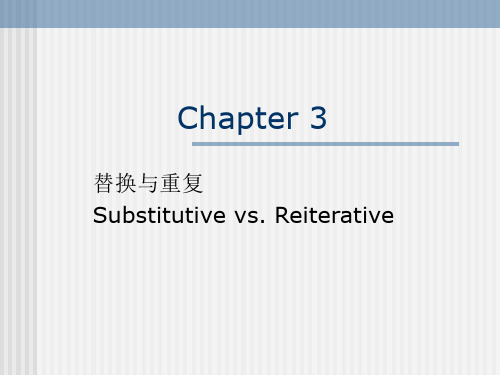
3 分句性替代
中华民族从来就是一个伟大的勇敢的勤劳 的民族,只是在近代落伍了。这种落伍, 完全是被外帝国主义和本国反动政府所压 迫和剥削的结果。 一个人的工作,究竟是三分成绩七分错误, 还是七分成绩三分错误,必须有个根本的 估价。
The Chinese have always been a great, courageous and industrious nation; it is only in modern times that they have fallen behind. And that was due entirely to oppression and exploitation by foreign imperialism and domestic reactionary governments. We must have a fundamental evaluation of a person’s work and establish whether his achievements amount to 30 percent and his mistakes to 70 percent, or vice versa.
3 句式重复
Now is the time for everyone to vote, for everything depends upon this election. All are against corruption, and so they should vote the Reform ticket. This is not a foolish thing, for the voters can elect anyone they want. But the people must turn out heavily, for if they do there is little doubt that they will elect the men they want.
英汉语言对比替换与重复

在翻译过程中,为了使译文更加清晰易懂,有时需要对原文中的语义进行重复,如将英语中的“I am a student”翻译为汉语中的“我是一个学生”。
在写作中的应用
词汇选择
在英语写作中,选择合适的词汇 进行替换和重复是提高语言表现 力的重要手段,如使用同义词或 反义词来丰富词汇表达。
句式变化
在英语写作中,通过改变句式结 构或使用不同的句型来替换和重 复,可以使文章更加生动有趣, 如使用排比句或对仗句。
对比分析英汉语言在替换与重复方面 的变化规律,揭示语言演变的共性和 特性,为语言政策和规划提供参考。
谢谢观看
非语言交际
在跨文化交际中,非语言交际也是重要的一环,通过肢体 语言、面部表情等非语言方式进行适当的替换与重复,可 以增强交际效果。
05
英汉语言替换与重复的 未来研究展望
替换与重复的认知机制研究
01
深入研究人类语言处理过程中替 换与重复的认知机制,探究其背 后的神经生理和心理过程。
02
对比分析英汉语言在替换与重复 方面的认知差异,揭示语言特性 和文化背景对认知过程的影响。
汉语词汇替换
汉语中也有类似的词汇替换现象,如“自行车”和“脚踏 车”,“手机”和“移动电话”。
汉语词汇重复
汉语中也有词汇重复的现象,如“好好学习,天天向上”, “他一直一直等待”。
语法层面的对比
英语语法替换
汉语语法替换
英语语法重复
汉语语法重复
英语中可以通过改变句子结构 或使用不同的时态、语态来表 达相同的意思,例如“I will go” 和“I am going”,“He has been working”和“He worked”。
汉语语义重复
替换与重复
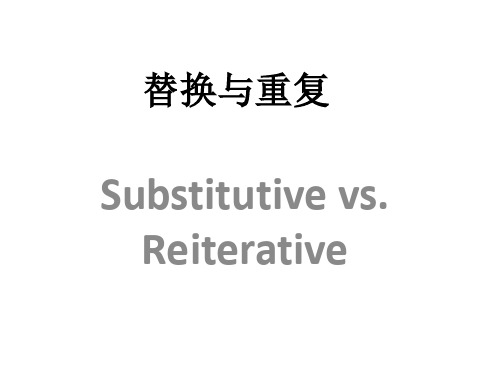
• 阅读训练人的眼睛, 说话训练人的口齿, 写作训练人的思维。 • (例句原文是平行排比句, 后两个分句承前省略了谓语动词
exercises) • 9)Association with the good can only produce good. With the wicked.
词组speak French)
• 4) People blieve that American team will win the football game. Peter think so, but I blieve not.
• 人们认为美国队将赢得这场足球赛, 彼得也是 这样想的, 我却认为并非如此。
• 由上面的例子可以看出, 英语倾向用意思相同或相 近的词来指上文出现过的人或事物, 使表达多样化, 而汉语较少采用这类变换, 通常重复同一人或事物 的名称。
• 综上所述, 英语的用词造句和表达与汉语有很大不 同。英语的行文通常使用替代、省略或变换的方 式来表达前面出现过的内容, 尽量避免同内容的重 复。而汉语的行文则通常重复前面出现过的内容, 很少使用替代等方式, 以使意思表达明确。
替换与重复
Substitutive vs. Reiterative
• 英语和汉语是两种不同的语言, 在表达上有很大的差 异。对比分析有助于外语学习与翻译(潘文国,1997)。
• 英语替换(substitution )与汉语重复(repetition ) 的差异对比
• 英语的替换主要是指: 英语比较忌讳重复, 如果在语 句里重复某个词语, 多用替代、省略或变换的表达方 法。汉语的重复在这里是指: 相对于英语的避免重复, 汉语多用重复形式, 连续使用某个词语是常见的事(庄 绎传, 2002)。这种现象有时不止出现在一句话里, 而 是出现在几句话里。具体情况如下:
- 1、下载文档前请自行甄别文档内容的完整性,平台不提供额外的编辑、内容补充、找答案等附加服务。
- 2、"仅部分预览"的文档,不可在线预览部分如存在完整性等问题,可反馈申请退款(可完整预览的文档不适用该条件!)。
- 3、如文档侵犯您的权益,请联系客服反馈,我们会尽快为您处理(人工客服工作时间:9:00-18:30)。
• 6) Ambition is the mother of destruction as well as of evil. • 野心不仅是罪恶的根源,也是毁灭的根源。 • (例句原文里, as well as 引导的并列结构中, of evil 前面承前省略 了the mother)
• 7) We won’t retreat, we never have and never will. • 我们不后退, 我们从未后退过, 将来也决不后退。 • (例句原文是并列句, 后两个分句承前省略了谓语动词retreat) • 8) Reading exercises one’s eyes, speaking. One’s tongue, while writing. One’s mind. • 阅读训练人的眼睛, 说话训练人的口齿, 写作训练人的思维。 • ( 例句原文是平行排比句 , 后两个分句承前省略了谓语动词 exercises) • 9)Association with the good can only produce good. With the wicked. Evil.近朱者赤, 近墨者黑。 • ( 例句原文是平行结构句 , 后面分句承前省略了名词 association 及谓语动词 can only produce)
• 省略表达和替代一样, 也是为了避免重复, 同时使上 下文结构紧凑。英语里, 省略和替代常常互相替换使 用, 因而有的语言学家把省略称为“零位替代” 。 英语的省略多出现在在并列结构中, 句子后面常常承 前省略已出现过的名词( 词组) 、谓语动词( 词组) 等 内容( 张振邦, 1983) 。 • 而汉语在这种情况下, 为了意思表达清楚和语法正确, 往往不使用省略, 而是重复这些词语或内容。请看下 面例子:
• 3 ) John doesn't speak French, but peter does . • 约翰不说法语, 但彼得说法语。 • (例句原文里, 代动词does 取代上文的谓语动词 词组speak French) • 4) People blieve that American team will win the football game. Peter think so, but I blieve not. • 人们认为美国队将赢得这场足球赛, 彼得也是 这样想的, 我却认为并非如此。 • ( 例句原文里, 后句里的so和not 取代上句的that 宾语分句)
c,分句性替代
用替代词so或not来取代充当宾语的that从句,用if so或if not来 取代条件从句,用as来取代分句的一部分,等等。汉语也有替代的 方式,但为了使表达正确、清楚,也常常重复其所代替的词语。例如 (1)People believe that the American team will win the football game. Peter thinks so,but I believe not. 人们认为美国队将赢得这场足球赛,彼得也是这样想的 我 却认为并非如此。 (2) We are told that he will come tonight,and if so, our meeting will be held tomorrow,if not,there won’t be any meeting tomorrow. 有人告诉我们今晚他会来,如果这样,会议明天就召开。 如果不是,明天不开任何会议。
• 由上可知, 英语里用代词等替代前文出现过 的词语或内容很常见, 翻译成汉语时, 通常不 用代称, 而用实称, 即重复被替代的词语和内 容, 只在个别时候酌情用简略表达, 如例( 6 )
• • • • • • • • • • •
二、省略(Omission)英语多省略( ellipsis ) , 汉语多重复 英语常常省略前面已出现过的词语。()处为省略部分。 如: I like strong tea. I suppose weak () is better for you. Sorry ,I haven’t finished the book yet. I hope you will () by tomorrow. This orange is ripe. I know () from its color. 英语常常承前省略相同的谓语动词或谓语动词词组的一部分; 汉语则较常承前省略相同的主语而重复相同的动词。 I belong to you and you (belong) to me. 我属于你,你也属于我 。 Dr .Bethune set to work as soon as he came to the front. 白求恩大夫一到前线,(他)就立刻开始工作。
• 1.1 英语表达常用替代(substitution) , 汉语常 用重复 • 在英语里, 为避免重复, 使行文简洁、有力, 常 用替代词(Pro一form )去替代上文出现过的词语 或内容(Shared words and content )(连淑能, 19 9 3 )。最常见的是用代词(人称代词、指示代 词、不定代词等)代替上文出现过的名词或名词词 组。此外还有用替代词do 或do 等取代上文出现 过的谓语动词(词组)以及用替代词5 0 或no t 等 取代上文出现过的从句。然而, 汉语表达则不然, 为了使句子意思表达明确, 常常重复英语里这些 替代词所替代的词语或内容, 只有少数情况下不 重复, 使用简略表达等方法。
• 3)The boy is climbing the tree. 那个男孩(少年, 小孩)在爬树。 • (例句原文里, boy 可使用同义词lady or child 来变换)
• 4) John has bought himself a new Ford. He practically lives in the car. • 约翰给自己买了一部新的福特牌汽车, 他几乎就住在 这部汽车里。 • (例句原文里, 用概括词the car 替代上文的a new Ford ) • 5) An electron tube is generally used for amplification , and • vacuum tube is another name for this device. • 电子管通常用来放大, 而真空管则是电到氢的另一名 称。 • (例句原文里, 用this device 替代上文的An electron tube)
• 由上面的例子可以看出, 英语倾向用意思相同或相 近的词来指上文出现过的人或事物, 使表达多样化, 而汉语较少采用这类变换, 通常重复同一人或事物 的名称。 • 综上所述, 英语的用词造句和表达与汉语有很大不 同。英语的行文通常使用替代、省略或变换的方 式来表达前面出现过的内容, 尽量避免同内容的重 复。而汉语的行文则通常重复前面出现过的内容, 很少使用替代等方式, 以使意思表达明确。 • 因而, 在英汉相互转换时, 要注意译文符合上述两 语言各自的表达习惯。
一、替代(substitution)
a.名词性替代. 名词性替代(Nominal Substitution)是指用代词或 某些名词来取代名词(词组).
He hated failure; he had conquered it all his life ,risen above it, and despised it in others. 他讨厌失败,他一生中曾战胜失败,超越失败,并且藐视别人的 失败。 英语常用代词,汉语少用代词,因而较长重复,这在汉译英时也 可以看出来: 我们的民族再也不是一个被人侮辱的民族了。 Ours is no longer a nation subject to insult and humiliation.
• 5) A man is called selfish, not for pursuing his own good, but for neglecting his neighbors'. • 说一个人自私自利, 并非因为他只图自己的利益, 而 是因为他不顾邻居的利益。 • (例句原文里, not… but 引导的并列结构中, neighbors’后 面承前省略了名词good )
• 由上可知, 英语为避免重复, 节约用词, 突出新信息并使上下文紧密连接, 在不损 害结构或引起歧义的情况下, 能省略的地 方都尽量省略。 • 而汉语则为了表达明确起见, 通常不这样 省略, 而是重复这些词语或内容。
三、变换(Variation)
英语常采用同义词替代、近义词复现和句式变化等方法来避 免重复。如电视机,可说:the television set, the TV, telly, the tube, the goggle-box, the idble,用the animal来代替horse等。 英语比较注重表达形式的多样化,力戒无意义的重复。但变 换要适度,不能给人以炫耀言辞的感觉,不应引起语义的含 混。 汉语一般较少采用这类变称,而较多重复同一名词。 1)Another method is the chemical process. 另外一种方法是化学方法 。 2)His credentials are deception, that’s exactly what he has. 他就是凭这个骗人的资格,他就是有这个骗人的资格。
替换与重复
Substitutive vs. Reiterative
• 英语和汉语是两种不同的语言, 在表达上有很大的差 异。对比分析有助于外语学习与翻译(潘文国,1997)。 • 英语替换(substitution )与汉语重复(repetition ) 的差异对比 • 英语的替换主要是指: 英语比较忌讳重复, 如果在语 句里重复某个词语, 多用替代、省略或变换的表达方 法。汉语的重复在这里是指: 相对于英语的避免重复, 汉语多用重复形式, 连续使用某个词语是常见的事(庄 绎传, 2002)。这种现象有时不止出现在一句话里, 而 是出现在几句话里。具体情况如下:
